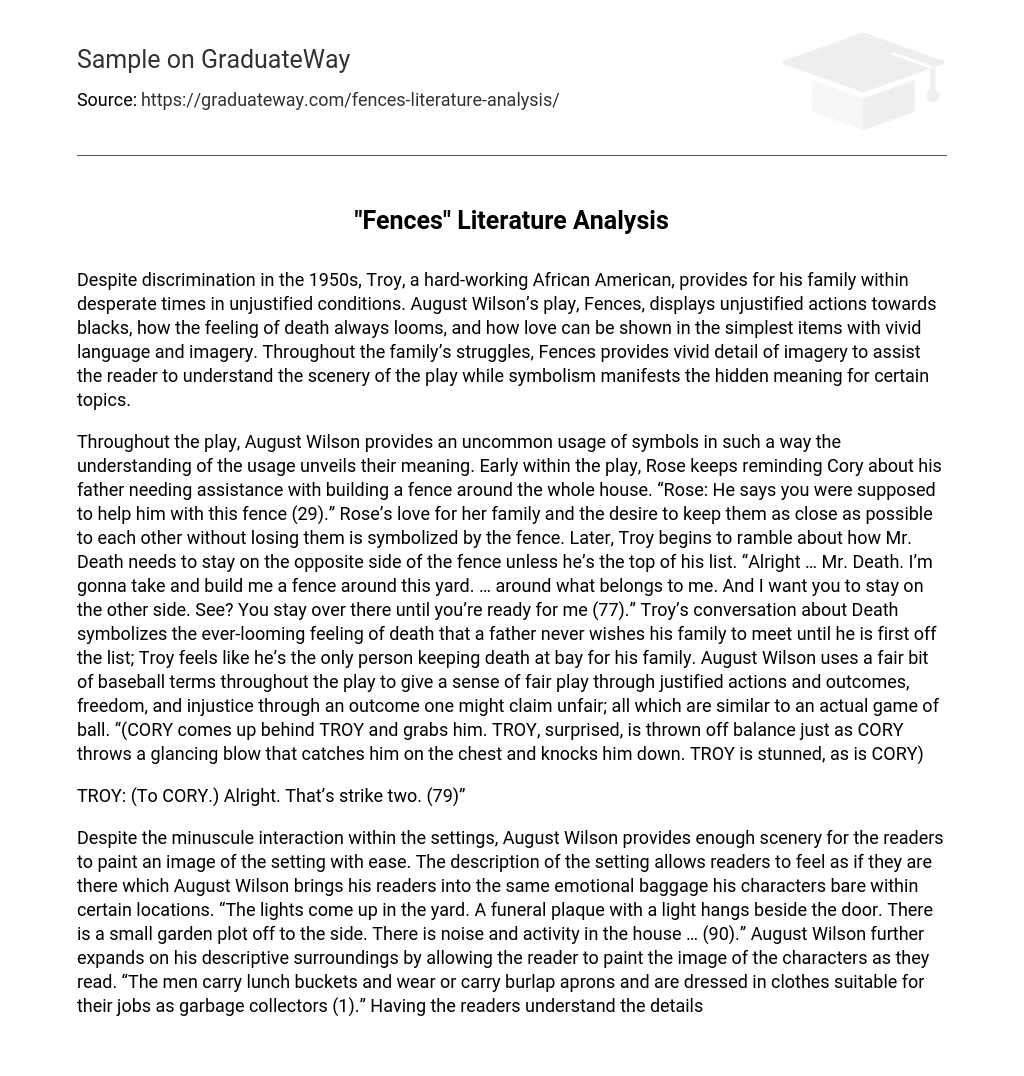Despite discrimination in the 1950s, Troy, a hard-working African American, provides for his family within desperate times in unjustified conditions. August Wilson’s play, Fences, displays unjustified actions towards blacks, how the feeling of death always looms, and how love can be shown in the simplest items with vivid language and imagery. Throughout the family’s struggles, Fences provides vivid detail of imagery to assist the reader to understand the scenery of the play while symbolism manifests the hidden meaning for certain topics.
Throughout the play, August Wilson provides an uncommon usage of symbols in such a way the understanding of the usage unveils their meaning. Early within the play, Rose keeps reminding Cory about his father needing assistance with building a fence around the whole house. “Rose: He says you were supposed to help him with this fence (29).” Rose’s love for her family and the desire to keep them as close as possible to each other without losing them is symbolized by the fence. Later, Troy begins to ramble about how Mr. Death needs to stay on the opposite side of the fence unless he’s the top of his list. “Alright … Mr. Death. I’m gonna take and build me a fence around this yard. … around what belongs to me. And I want you to stay on the other side. See? You stay over there until you’re ready for me (77).” Troy’s conversation about Death symbolizes the ever-looming feeling of death that a father never wishes his family to meet until he is first off the list; Troy feels like he’s the only person keeping death at bay for his family. August Wilson uses a fair bit of baseball terms throughout the play to give a sense of fair play through justified actions and outcomes, freedom, and injustice through an outcome one might claim unfair; all which are similar to an actual game of ball. “(CORY comes up behind TROY and grabs him. TROY, surprised, is thrown off balance just as CORY throws a glancing blow that catches him on the chest and knocks him down. TROY is stunned, as is CORY)
TROY: (To CORY.) Alright. That’s strike two. (79)”
Despite the minuscule interaction within the settings, August Wilson provides enough scenery for the readers to paint an image of the setting with ease. The description of the setting allows readers to feel as if they are there which August Wilson brings his readers into the same emotional baggage his characters bare within certain locations. “The lights come up in the yard. A funeral plaque with a light hangs beside the door. There is a small garden plot off to the side. There is noise and activity in the house … (90).” August Wilson further expands on his descriptive surroundings by allowing the reader to paint the image of the characters as they read. “The men carry lunch buckets and wear or carry burlap aprons and are dressed in clothes suitable for their jobs as garbage collectors (1).” Having the readers understand the details of characters and their surroundings allows the reader to have a surreal sense of being able to feel as if they are there and able to interact with them from simply reaching a hand to touch them.
August Wilson provides characters with vivid descriptions allowing the readers to understand in full as to who they should be visioning within their mind as they venture further into the play. Within the first page of the play, August Wilson begins with a description of Troy and the setting around him and his friends. “TROY is fifty-three years old, a large man with thick, heavy hands; it is this largeness that he strives to fill out and make an accommodation with (1).” After a quick introduction to Troy and his personality, August Wilson brings another character, Rose, into the scene in such detail one could easily understand how her morals without even hearing a single word from her. “ROSE enters from the house. She is ten years younger than TROY, her devotion to him stems from her recognition of the possibilities of her life without him: a succession of abusive men and their babies, a life of partying and running the streets, the Church, or aloneness with its attendant pain and frustration (5).” Allowing the reader to know and understand a character’s backstory, August Wilson shows us how she came to be the way she is currently along with the morals we would have missed if he neglected to put it in the play.
Throughout the play, the reader is enticed by the mellow drama between the characters as imagery puts the reader there with the characters. Seeking and understanding the symbolism, the reader also can understand why August Wilson would use certain phrases and terms to breathe a form of life into each character. August Wilson’s deceptive use of symbolism and his minuscule usage of imagery gives his play charm with how the characters interact with each other as the setting around them begin to form and paints itself right in front of the reader.





